What Is Regenerative Agriculture? California Farmers Share Their Values and Practices
Selina Knowles, Communications Coordinator
April 19, 2024
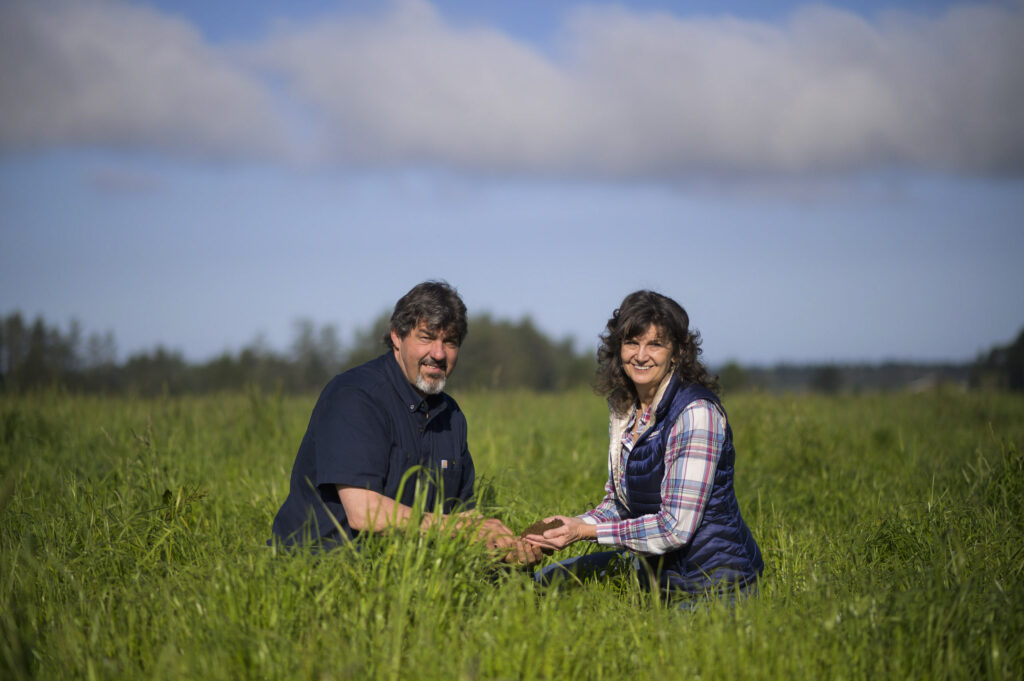
Many farmers market shoppers may be familiar with the term “organic” as a way of indicating food that is grown with ecological farming practices, in accordance with USDA organic standards. In recent years, the term “regenerative” has been rising in popularity, but many shoppers may have questions about what this term means, how it differs from organic, and how it is regulated.
For Earth Day and SF Climate Week, we asked farmers at the Ferry Plaza Farmers Market to share what “regenerative” means to them, how it complements or differs from organic certification, and what regenerative practices look like on their farms.
Defining Regenerative Organic
In 2017, a group of farmers, agricultural organizations, and brands and business leaders established the Regenerative Organic Alliance and Regenerative Organic Certification. The certification is distinct from and unregulated by the USDA. The Regenerative Organic Alliance sought to address some gaps in the USDA Certified Organic seal, and they created their Regenerative Organic Certification to encourage and measure three primary things on farms: soil health, animal welfare, and social fairness.
Building soil health includes using practices that build organic matter and promote biodiversity. As we face climate change, the biodiversity and carbon containment prioritized in regenerative practices are more essential than ever. Animal welfare looks like grass-fed, pasture-raised animals, which have access to safe shelter. Social welfare means paying farmworkers a living wage and providing safe working conditions.
The options for Regenerative Organic Alliance Approved Certifying Bodies is growing, making certification more accessible. However, small farms in particular are still grappling with the time and financial cost of taking the steps to become certified. Some opt to farm according to the regenerative ethos without third-party certification.
Certified Regenerative Organic Farms
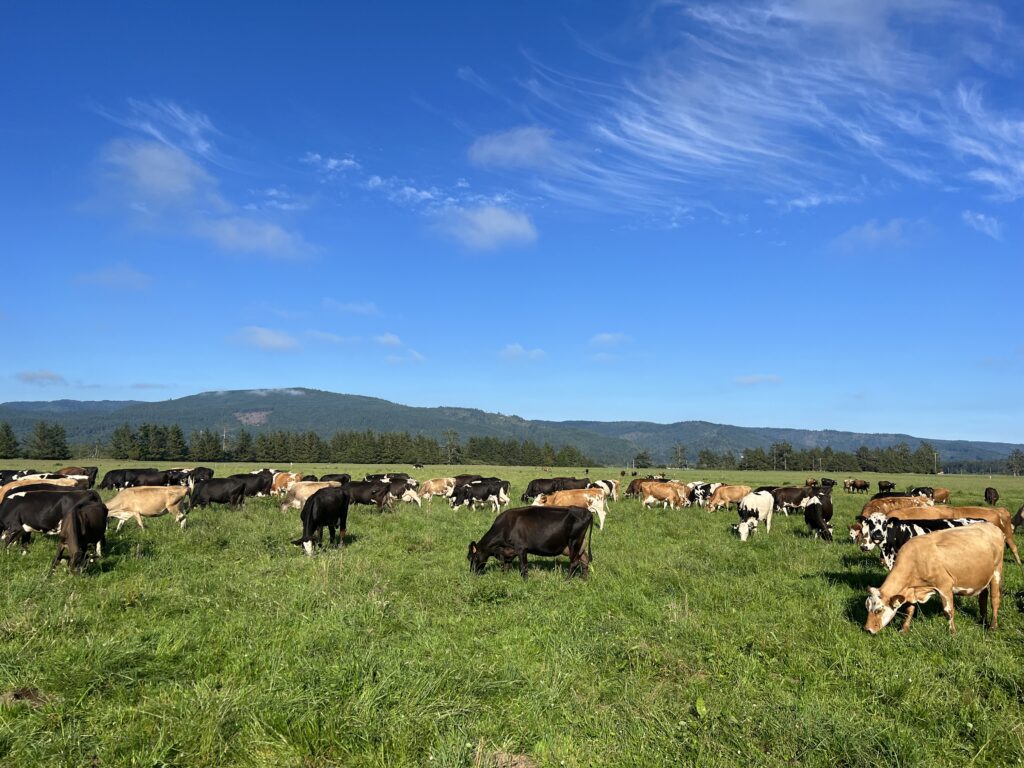
Alexandre Family Farm
The Alexandre Family Farm is a multi-generation grass-based dairy farm based in Crescent City. The Alexandre family made the decision to use organic farming practices, including regenerative practices, in 1999, before the standard certification of USDA’s national organic standards existed. “It was important to caretake the long-term health of our herds and our farm,” says Stephanie Alexandre, farmer and founder. “Most of all, we saw organic as the pathway to ensure we could pass our family farm to our children.”
In 2021, they became the first dairy farm to be Regenerative Organic Certified in the United States. On Alexandre Family Farm, the family works with the animals to create a cycle of carbon sequestration, as they recently shared with TIME magazine.
“Our cows and hens are our great partners in this effort,” says Stephanie. By rotationally grazing our animals, they play an important role in building the beneficial soil organic matter that supports our pastures’ capabilities to sequester carbon deep into the ground.” Additionally, Alexandre Family Farm composts with inputs from the farm, fish waste from local fisheries, and wood shavings from a Southern Oregon mill.
Alexandre Family Farm is certified by The Savory Institute’s Land to Market program, which verifies farms’ holistic regenerative agricultural practices using its Ecological Outcome Verification plan. “There is no guesswork involved,” says Stephanie. “We are honored to have earned the Land to Market certification.”
Ferry Plaza Farmers Market, Saturday. Mission Community Market, Thursday.
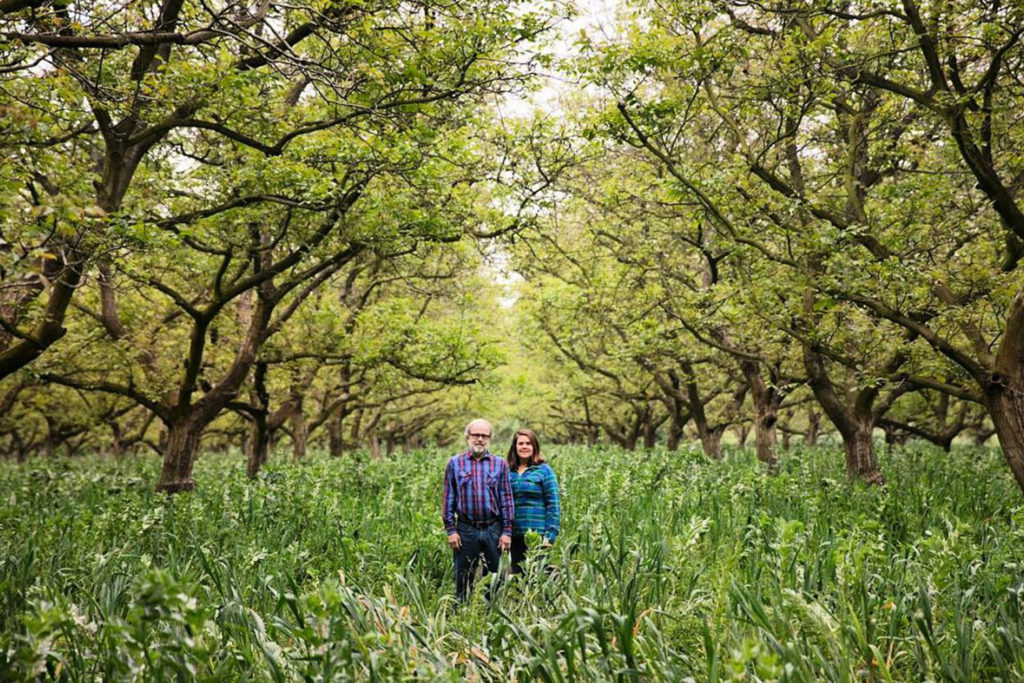
Old Dog Ranch
Fifth-generation farmer Mollie Sitkin, and her father, Roger Sitkin, run Old Dog Ranch in Linden. They received their Regenerative Organic Certification in 2021, making them the first walnut farm to do so.
“The first thing that attracted me to Regenerative Organic farming was actually the social equity pillar,” says Mollie. For her, Regenerative Organic Certification is a tool to communicate social equity policies to customers, including a liveable wage and safe on-site housing.
Agriculturally, Mollie describes Regenerative Organic as “organic plus.” While organic is based on inputs, regenerative is more about the output, in terms of the life and health of the soil. Thinking regeneratively meant completely changing the way she looked at the soil. Now, more than 90 percent of Old Dog Ranch’s orchard is covered with unique and diverse flora and fauna.
Mollie encourages shoppers to look for Regenerative Organic Certification. “I think that certification is really important because marketing can be pretty deceptive,” she says. “Regenerative as a label doesn’t really mean too much unless you can either verify a practice by knowing your farmer and going to the farm or having somebody else do that for you.”
Ferry Plaza Farmers Market, first Saturday of each month.
Noncertified Regenerative Farms
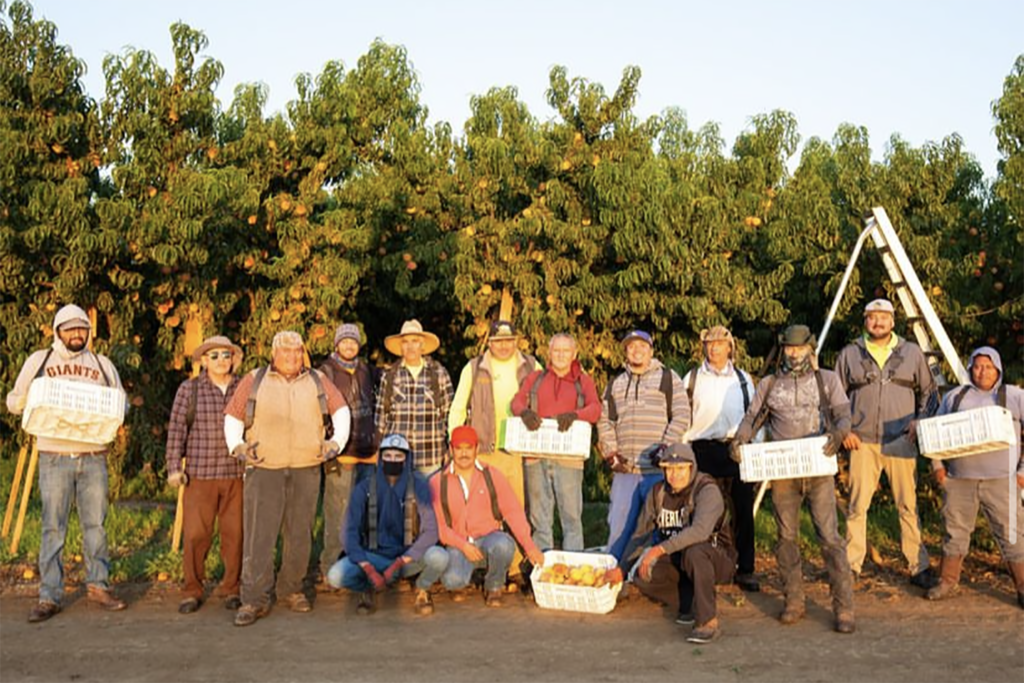
Frog Hollow Farm
Frog Hollow Farm is a Certified Organic farm that practices their own form of (noncertified) regenerative organic farming. For Farmer Al Courchesne, this means focusing on what is generated within the soil, in addition to what goes into it. “The idea of regenerative agriculture has to do with the soil, the plant community that lives in the soil, and the human community that works the land,” he says.
On Frog Hollow Farm, composting is a major element of their regenerative practices. “It’s all about keeping an eye on the cycle of life and recycling,” he says. Their compost often includes plant and animal matter, such as fish emulsion, seaweed, and oyster shells, which all help to restore microbial life in the soil.
Frog Hollow Farm also provides housing for farmworkers. “People really depend on us to provide them with shelter and places to raise their family. We’ve got second- and third-generation families living here on the farm now,” says Al. Field and packing workers on Frog Hollow Farm also participate in weekly wellness workshops, where they address job-specific stressors and practice tools to support their physical and mental health.
Frog Hollow Farm has been CCOF Certified Organic since 1989. Al has considered seeking Regenerative Organic Certification, but is waiting for a certification process he’s confident in. “Once our organic certification, which is CCOF, has a program that we agree with, then we’ll probably seek to get regenerative certification,” he says.
Ferry Plaza Farmers Market, Saturday.
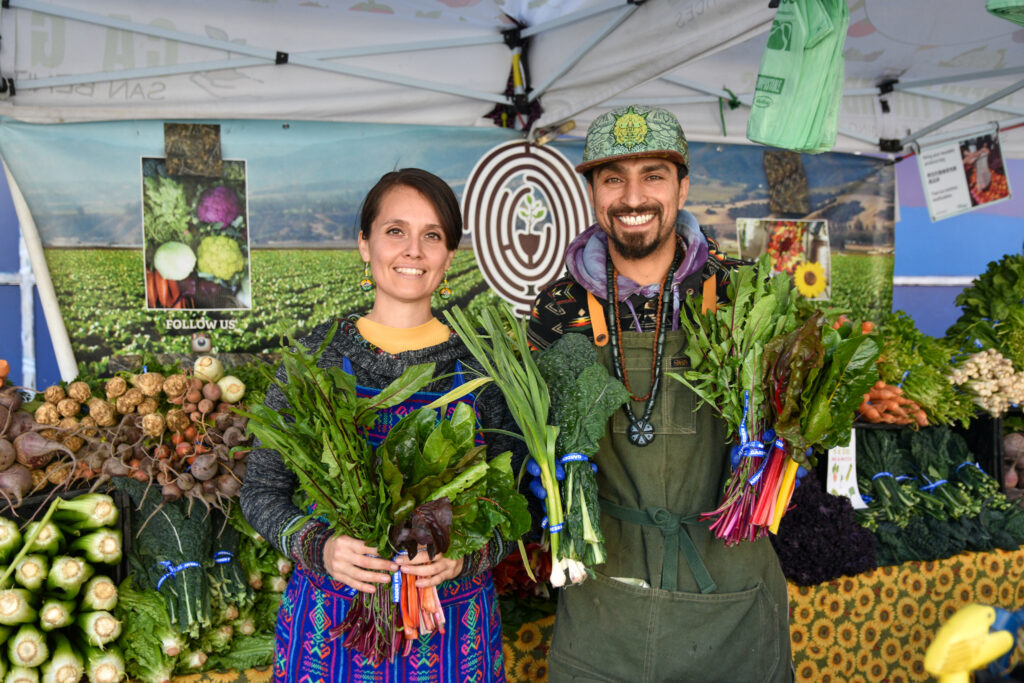
Green Thumb Farms
In San Juan Bautista, fourth-generation farmer Rudy Jimenez runs Green Thumb Farms using traditional Indigenous farming practices that have been passed down through generations, core in which is biodiversity and building soil health.
“Regenerative means diversifying the plants and taking care of the soil, making sure that I never leave it empty,” says Rudy. On the farm, Rudy and his team grow over 60 varieties of produce year-round, placing them strategically. For example, they plant basil adjacent to tomatoes to minimize pests on both.
Green Thumb Farms was previously certified organic, but opted out of recertification last year due to time and cost of the certification process. Rudy says that he is working on renewing or getting different certification to provide assurance for shoppers.
“We have a couple inspections coming up,” says Rudy. “We do want to get a certification to build the trust with our clients and a shared understanding that we still keep the same core values for our business.” He hopes to work with a certifier who supports farmers along the way of implementing ecological methods and provides resources and spaces for shared knowledge between farmers.
Ferry Plaza Farmers Market, Tuesday and Saturday. Mission Community Market, Thursday.
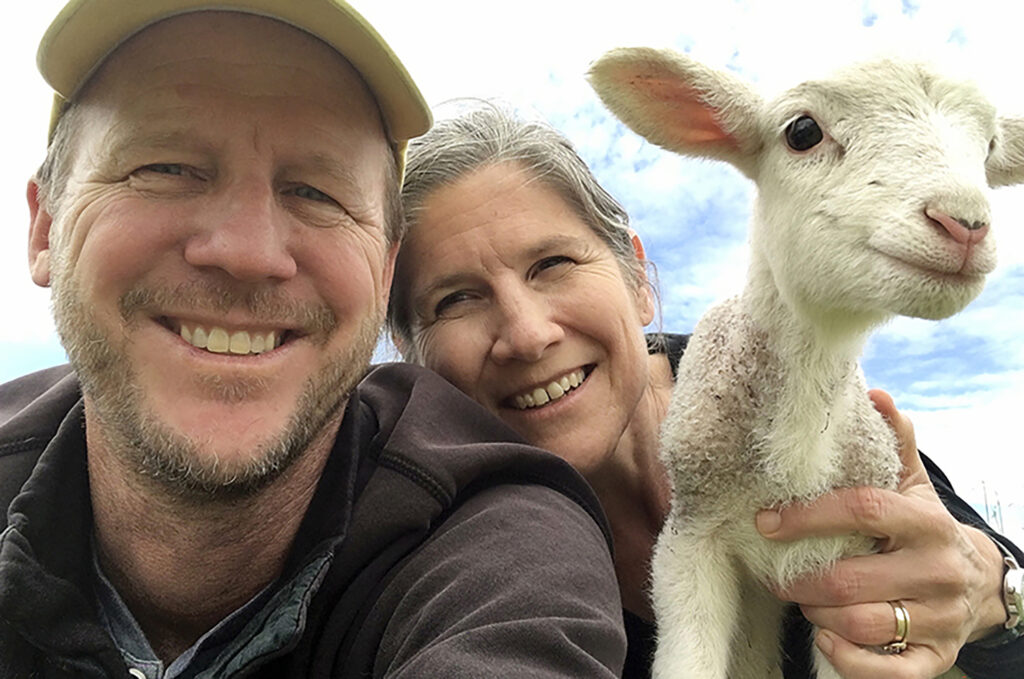
Massa Organics
Greg Massa and Raquel Krach operate Massa Organics, a CCOF Certified Organic farm in Hamilton City. While growing rice, nuts, and citrus, the Krach-Massas keep regenerative principles at the forefront of their farming. “As a co-owner and farmer of Massa Organics and as an academic researcher in Regenerative Agriculture at Chico State, the meaning of regenerative farming is central to my worldview,” says Raquel.
In Raquel’s opinion, the once-optimistic and unregulated term “sustainable” no longer holds much meaning since its been coopted for greenwashing. While “certified organic” is an important distinction, it may not be as ecologically positive as it is assumed to be. “Often, large-scale organic farms are still reductive in nature, focusing on the health of a single crop at the expense of the soil, and the greater ecological context,” she explains.
“The word ‘regenerative’ is also now trendy, but I think it is more helpful because it focuses on ways to improve our degraded agroecosystems, and ecosystem services such as cleaner air and water, rather than sustaining the status quo,” says Raquel. When asked about Regenerative Organic Certification, Raquel shares, “Honestly, we just haven’t had time,” a common sentiment among small family farmers.
At Massa Organics, there is something growing on every part of the farm year-round, and the soil is rarely bare and exposed. They never till the ground in their almond and mandarin oranges, and they always grow either native vegetation or a multi-species cover crop. Their herd of 100 Dorper sheep also graze the vegetation in the orchards and some of the cropland.
Ferry Plaza Farmers Market, Saturday.
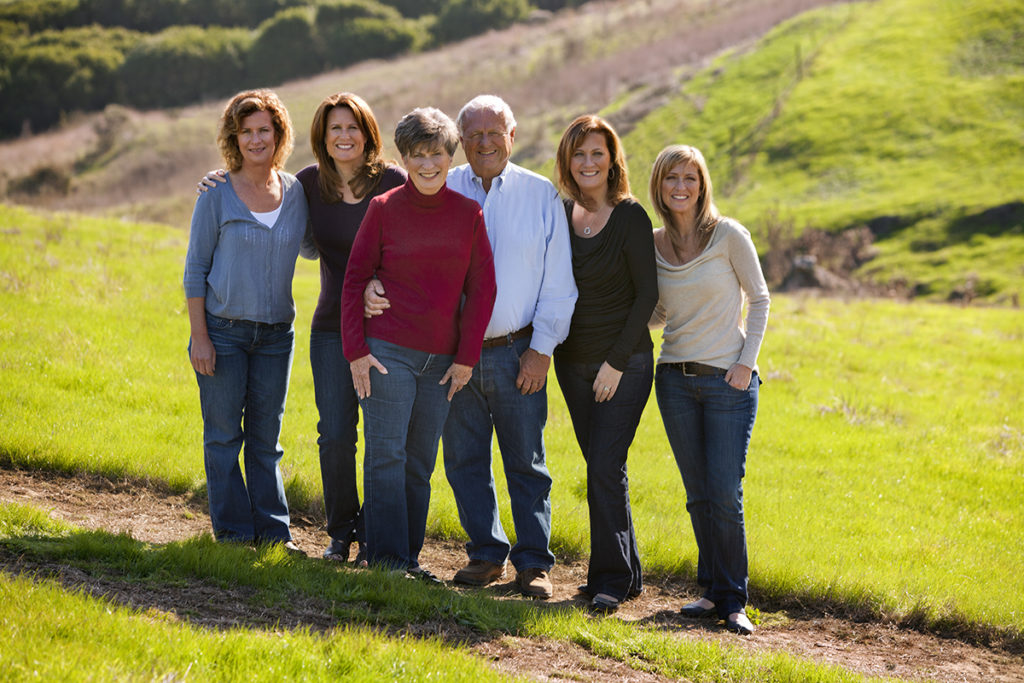
Point Reyes Farmstead Cheese Company
Point Reyes Farmstead Cheese Company is owned and operated by the Giacominis, a third-generation ranching family. The Giacominis view regenerative farming as a holistic approach to agriculture that improves the health of the land over time. Plus, healthy pastures directly impact the flavor of their cheeses.
On their pastures in Point Reyes, the family leverages on-farm nutrient cycles. They focus on rotational grazing to improve pasture quality and sequester carbon. They also use their own herd’s waste as natural fertilizers, in the form of both dry compost and liquid fertilizer, to nourish the soil.
“While we recognize the value of certification programs like Regenerative Organic Certification, our focus remains on implementing regenerative practices that benefit our farm, the environment, and our community,” says farmer Lynn Giacomini Stray. “We prioritize practical outcomes and continuous improvement over formal certification.”
Ferry Plaza Farmers Market, Saturday.
Topics: Animal welfare, Environment, Farmers, Organic, Soil
